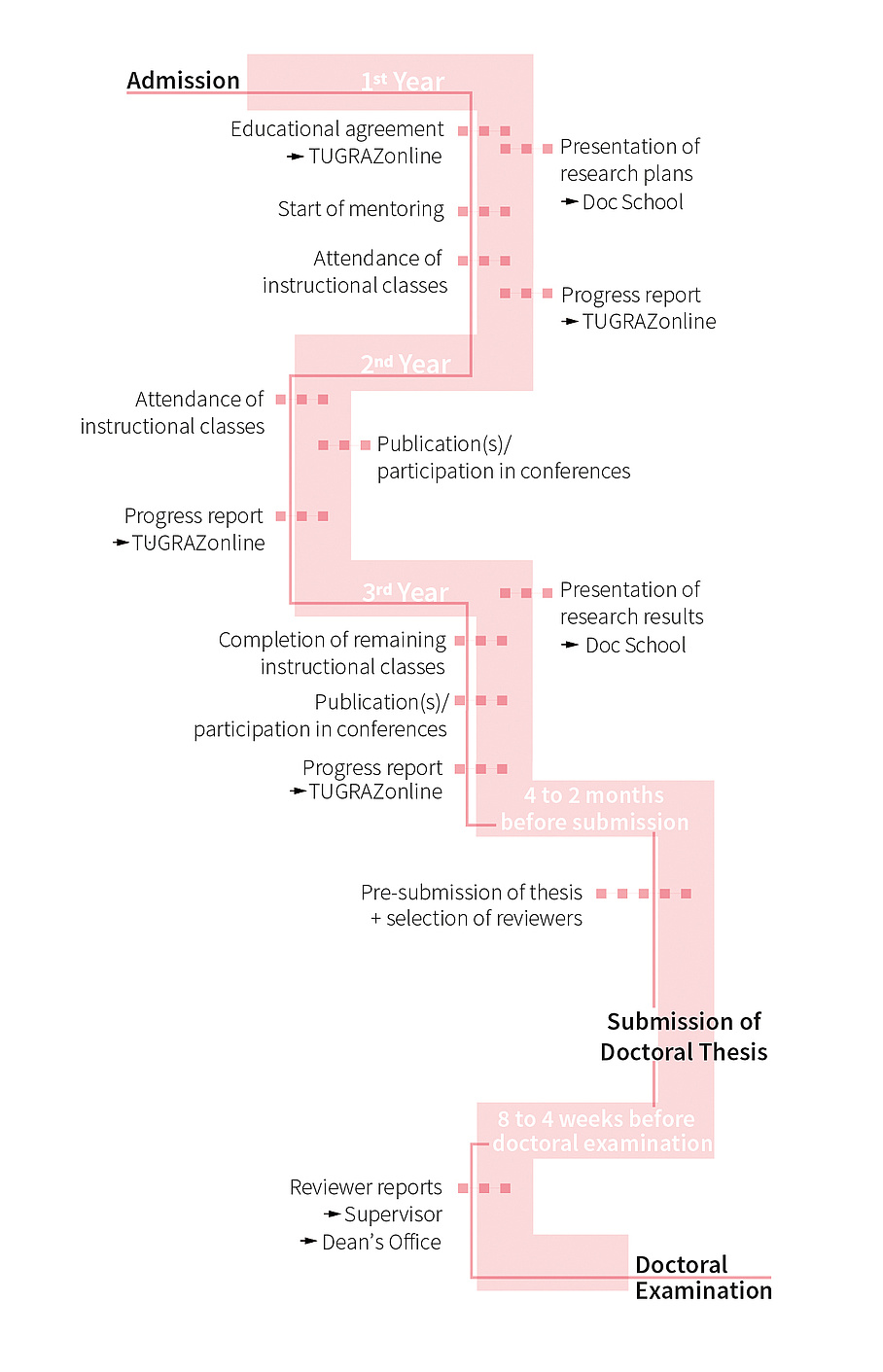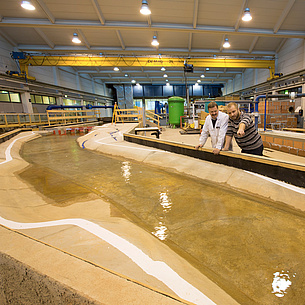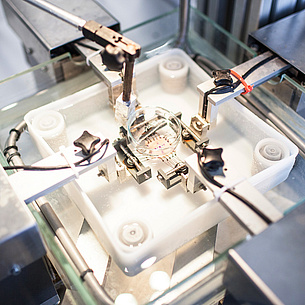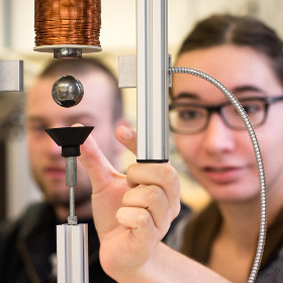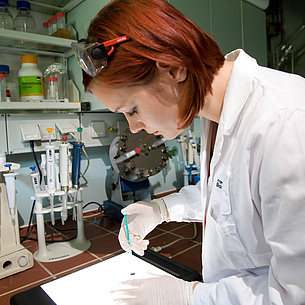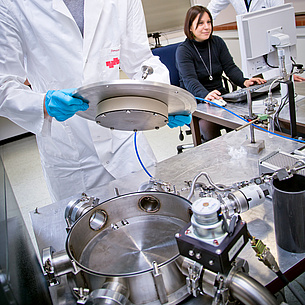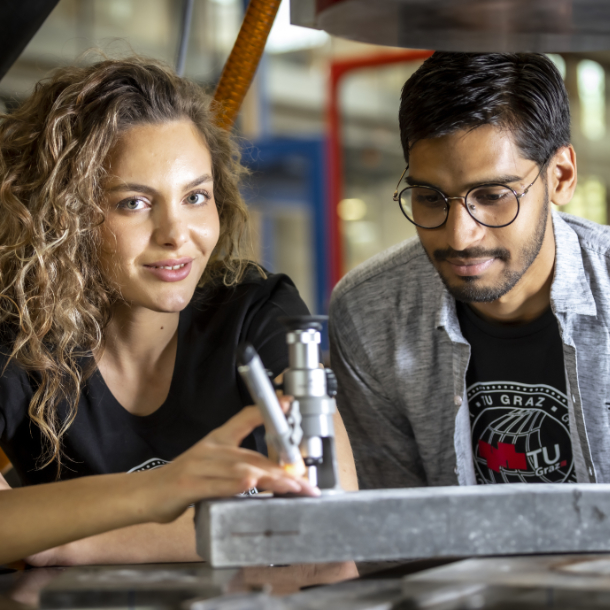
Quick Facts
- Period of study: The minimum duration is six semesters (3 years).
In this time, you should perform all the research, write your doctoral thesis and complete the instructional classes of the doctoral programme. - Language: English
Courses are held in English or German. - Academic degree: “Doktorin der Technischen Wissenschaften” / “Doktor der Technischen Wissenschaften” (Doctor of Technical Sciences), abbreviated as “Dr.techn.” or “Doktorin der Naturwissenschaften” / “Doktor der Naturwissenschaften” (Doctor of Natural Sciences), abbreviated as “Dr. rer. nat.”.
The international equivalent of this university degree is “Doctor of Philosophy”, abbreviated as “PhD”. - Curricula:
Contact
Coordination Office Doctoral Studies
Dr. Sabine VOGL
Phone: +43 316 873 8558
doctoralstudies@tugraz.at
Admission and Course of Studies
Prerequisite for starting a doctoral programme at TU Graz is a relevant master’s degree (or equivalent) in the respective field from a university or another recognised post-secondary educational institution.
For admission you need to find a supervisor who is willing to provide you with a supervision confirmation. Afterwards, you can enrol as a doctoral student at the Registrar's Office.
The Doctoral Schools cover a wide spectrum of research fields in which you can write a thesis. On the website of each doctoral school you can find the subject areas and contact details of potential supervisors.
If one of these people agrees to supervise you, they will give you a letter of confirmation that you can submit as part of the admissions process.
You can use the template for the supervision confirmation.
Graduates of TU Graz
If you have graduated from your master’s degree programme at TU Graz, you only need the supervision confirmation for admission. With the confirmation you can go to the Registrar's Office and register for the ‘Doctoral Programme in Technical Sciences’ or the ‘Doctoral Programme in Natural Sciences’
Graduates of other universities or recognised post-secondary educational institutions
Graduates of other universities or recognised post-secondary educational institutions have to do an online application for the doctoral programme. You can find the required documents and the procedure here: Online application for the doctoral programme.
After admission to the doctoral programme, you and your supervisor (and co-supervisors) define a topic for your doctoral project and conclude an educational agreement. The necessary forms must be submitted electronically via TUGRAZonline (“My Doctoral Project”) within the first 3-6 months (at most 12 months) of your studies. Students can find further information on the intranet TU4U on the pages of the responsible dean's office:
- Deans Office for Architecture
- Dean’s Office for Civil Engineering
- Dean’s Office for Mechanical Engineering and Economic Sciences
- Dean’s Office for Electrical and Information Engineering
- Dean’s Office of the Faculty of Mathematics, Physics and Geodesy
- Dean's Office for Technical Chemistry, Chemical and Process Engineering, Biotechnology
- Dean’s Office for Computer Science and Biomedical Engineering
The supervisor – as an expert in your field – is your professional guide, your first response, your role model during the whole period of your doctoral study, who enables you to become a self-organized researcher. You are expected to show your own engagement and initiative and be self-organized during your doctoral study.
PhD students can nominate a mentor as a guide through the doctoral project, complementing the supervisor. More information on the Mentoring
During the doctoral programme you need to complete instructional classes for at least 18 ECTS-credits. These consist of courses on subject specifics, soft skills, scientific methods and communication, as well as a privatissimum.
If your master's degree is from outside the field of your doctoral study, the Dean of Studies may require more than the 18 ECTS-credits. Usually, at the beginning of your studies you select appropriate courses together with your supervisor and submit the selection to the Dean of Studies.
You are obliged to submit yearly reflection and progress reports via TUGRAZonline (“My Doctoral Project”) at the end of each year of your studies. These reports stimulate you to reflect on your progress so far and allows you to plan your next steps in the forthcoming year – use this chance! The yearly report also serves as a good starting point for the annual employee appraisal and your meetings with your mentor.
TU Graz activities in doctoral education are structured in different Doc Schools. Your Doc School is the home of all doctoral students and senior scientists of your field at TU Graz. Members of the Doc School are your first collaboration partners and colleagues to learn from and discuss problems with. You will also present your proposal and research results to them, in meetings of all the Doc School members (“Doc Days”) or in the Doctoral Seminar. A minimum of two presentations to the Doc School – one at the beginning and one at the end of your studies – is compulsory.
It is essential for your doctoral study to use the knowledge and expertise of your Doc School, your research group and the whole scientific/ arts community and to combine it with your own ideas to realize your research and contribute back to the community. Another important part of your studies is to disseminate your research results in scientific publications, present them at conferences/exhibitions and build an international scientific network.
Doctoral thesis (Dissertation)
At the end of your studies, you write a doctoral thesis. It documents your ability to master new scientific problems independently.
Students can find details on formal criteria and how to submit their doctoral thesis on the intranet TU4U:
- Deans Office for Architecture
- Dean’s Office for Civil Engineering
- Dean’s Office for Mechanical Engineering and Economic Sciences
- Dean’s Office for Electrical and Information Engineering
- Dean’s Office of the Faculty of Mathematics, Physics and Geodesy
- Dean's Office for Technical Chemistry, Chemical and Process Engineering, Biotechnology
- Dean’s Office for Computer Science and Biomedical Engineering
Assessment and doctoral examination (defense)
The reviewers provide a written assessment of the thesis. The doctoral examination is your final exam in the doctoral programme. You start by giving a 30 minutes presentation of your research results. Afterwards, you are orally examined by the examination committee and defend your thesis.
Mentoring und Buddy System

Mentoring for doctoral students
PhD students have the right to nominate a mentor, who will accompany them through their doctoral project. Mentors should not be regarded as competitors to Supervisor, but as complementing person, who could bring in additional scientific expertise or give personal advice or mental support to the student as an experienced academic in regularly scheduled meetings.
Find a mentor
- Find a mentor by yourself or via your Doc School
- Report name of mentor to Doc School by declaring your mentor in the Doctoral management tool („My Doctoral Project“)
- Optional: Sign confidentiality agreement (you and mentor)
- Meet your mentor regularly throughout your studies
For details about how to get a mentor see or ask the coordination office for doctoral studies: doctoralstudies@tugraz.at.
Buddy System by the PhD Union
The PhD Union is the student association for doctoral students at the TU Graz and is also organising the Buddy-System:
- Peer-to-peer student support, by experienced doctoral students (after the first year of doctoral study or above)
- especially for doctoral students who don't know the TU Graz yet,
- Guidance on eye level
- for organisational and study related questions,
- to understand local and institute-specific customs and students' life challenges and
- orientation on campus and in Graz.
If you are interested in a buddy, please contact the PhD Union.
Further Advice and Support
Question about admission?
Contact the Registrar's Office:
admission.phd@tugraz.at
Phone: +43 316 873 6629
Questions about the programme?
If you have any questions about the content of the doctoral programme, the speaker and the student representative of the respective doctoral school will be happy to help.
Other points of contact
- Ombudsperson for students
Mediates between several institutes or institutions in problematic situations - Psychosocial counselling for TU Graz students
- Working Group for Equal Opportunities
provides support in matters relating to equal treatment and anti-discrimination as well as the advancement of women and families - Works Council for Academic Personnel
provides support with labour law issues - Curricular Committee for PhD Programmes
is a Senate body responsible for drawing up and revising the curricula for doctoral studies
